Items
Tag is exactly
religion
-
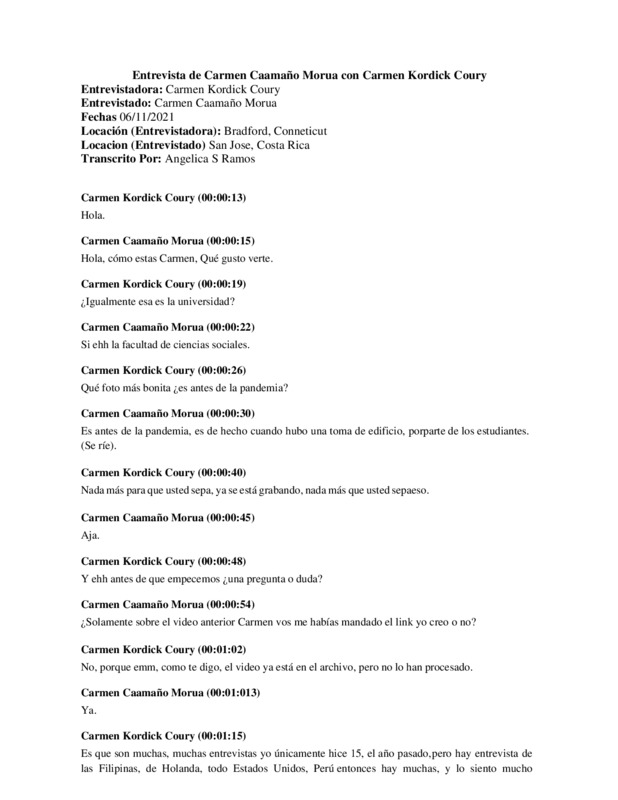 06/11/2021
06/11/2021Carmen Caamaño Morua Oral History, 2021/06/11
En esta entrevista Carmen Caamaño Morua es entrevistado por Carmen Kordick Coury concerniente al covid-19 en Costa Rica. Carmen es profesora en la Universidad de Costa Rica y vive en San José. Habla de su trabajo virtual en la universidad, del crisis de la salud mental y de la gente que cree en las teorías de la conspiración. Carmen habla de la relación entra las ciencias y la religión y como eso afecta los sentimientos hacia la vacuna. Habla de la xenofobia, el racismo y el clasismo. También habla de las vacunas y la respuesta del gobierno. Para terminar, Carmen habla del gobierno, la economía y las noticias. -
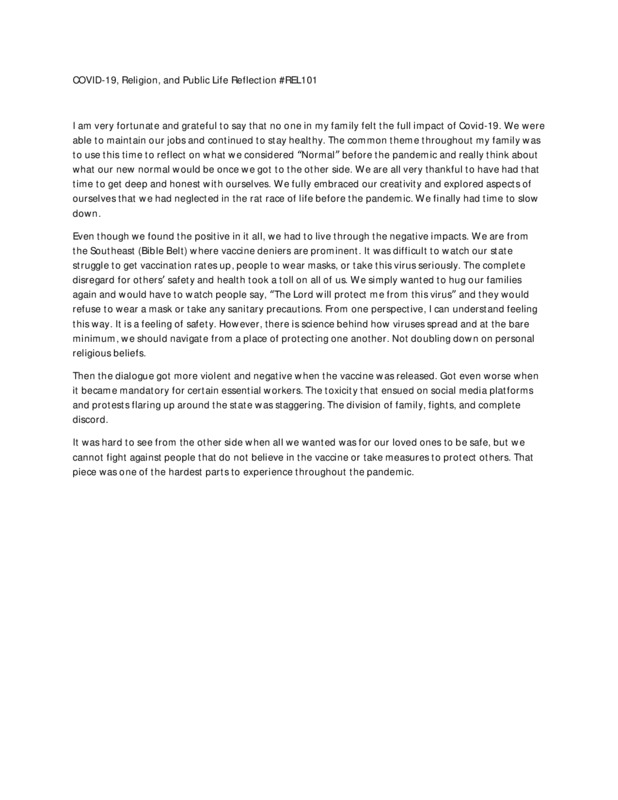 2022-04-28
2022-04-28COVID-19, Religion, and Public Life Reflection #REL101
To shine a light on the tension between Science and Religion -
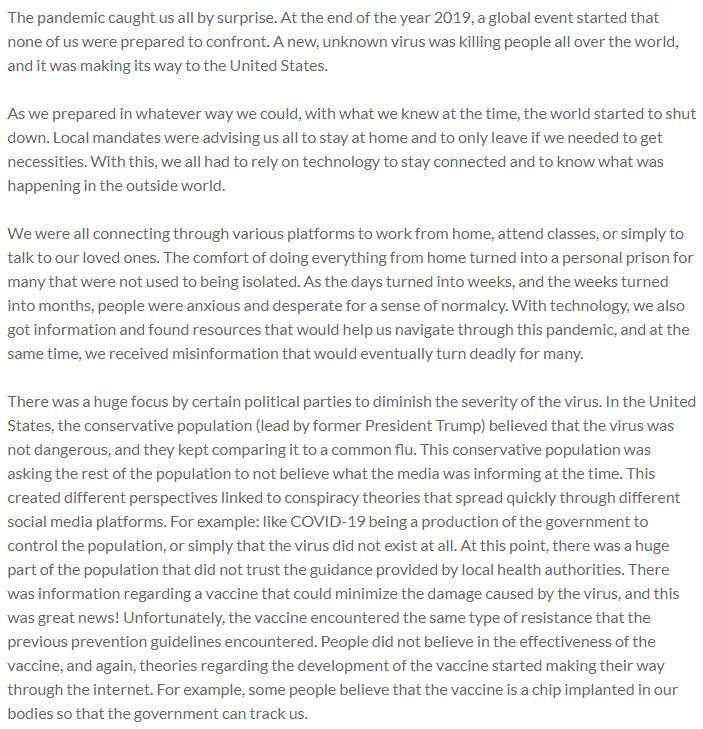 2022-04-26
2022-04-26The Digital World and COVID-19
The pandemic caught us all by surprise. At the end of the year 2019, a global event started that none of us were prepared to confront. A new, unknown virus was killing people all over the world, and it was making its way to the United States. As we prepared in whatever way we could, with what we knew at the time, the world started to shut down. Local mandates were advising us all to stay at home and to only leave if we needed to get necessities. With this, we all had to rely on technology to stay connected and to know what was happening in the outside world. We were all connecting through various platforms to work from home, attend classes, or simply to talk to our loved ones. The comfort of doing everything from home turned into a personal prison for many that were not used to being isolated. As the days turned into weeks, and the weeks turned into months, people were anxious and desperate for a sense of normalcy. With technology, we also got information and found resources that would help us navigate through this pandemic, and at the same time, we received misinformation that would eventually turn deadly for many. There was a huge focus by certain political parties to diminish the severity of the virus. In the United States, the conservative population (lead by former President Trump) believed that the virus was not dangerous, and they kept comparing it to a common flu. This conservative population was asking the rest of the population to not believe what the media was informing at the time. This created different perspectives linked to conspiracy theories that spread quickly through different social media platforms. For example: like COVID-19 being a production of the government to control the population, or simply that the virus did not exist at all. At this point, there was a huge part of the population that did not trust the guidance provided by local health authorities. There was information regarding a vaccine that could minimize the damage caused by the virus, and this was great news! Unfortunately, the vaccine encountered the same type of resistance that the previous prevention guidelines encountered. People did not believe in the effectiveness of the vaccine, and again, theories regarding the development of the vaccine started making their way through the internet. For example, some people believe that the vaccine is a chip implanted in our bodies so that the government can track us. In times of uncertainty, those who practice religion tend to turn to religion for comfort and guidance. In some cases, certain religious groups were advising their congregations to put all their trust in God, and that he would protect them from the virus, without the need of a vaccine. The clash of religion and science made it more difficult for the population to come out victorious from a very challenging time. More than 2 years later, and we are still seeing the effects of the pandemic in society. There is an emotional divide that lingers in our communities, not just a physical distance. Communities want to have their normal lives back but fail to realize that these are their normal lives now. -
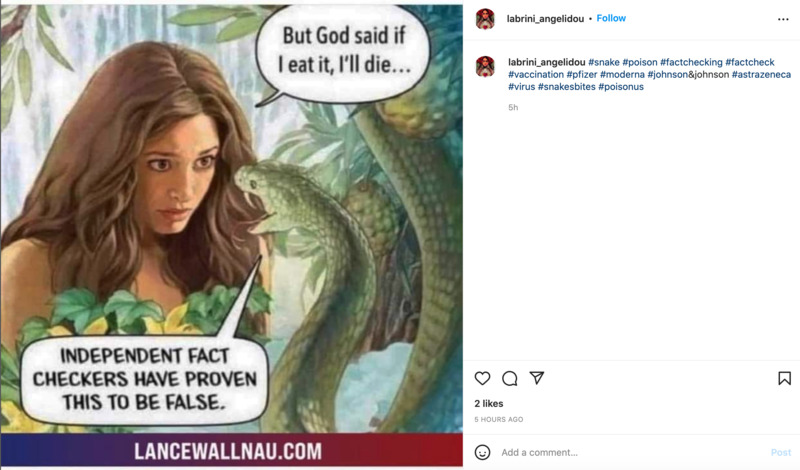 2022-04-07
2022-04-07Fact Checkers Have Proven This False
This is an Instagram post by labrini_angelidou. This is a parody of the Adam and Eve story in the Bible, but it uses the fruit in place of the vaccine. The snake is representative of those encouraging you to take the vaccine, because the fact checkers have proven death from vaccines to be false. In the tags, many vaccines are listed, such as: Johnson and Johnson; Astrazeneca; Pfizer; and Moderna. -
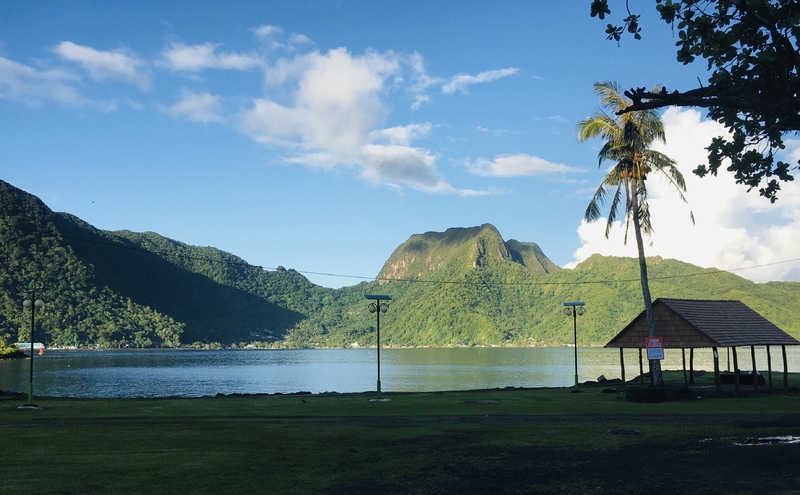 2022-04-05
2022-04-05Big Changes to a Small Island
At the "heart" of Polynesia, (referring to its geographic location in the Polynesian triangle) American Samoa appears as another tiny dot on the map. Nevertheless, it means the WORLD to its 55,000+ people, and to some, it is all they have ever known as their home. It is also the southernmost territory of the United States (below the Equator) and the second to the last place on earth to always welcome the New Year LAST. Perhaps it coincidently depicts the slow-paced nature of the island to which many visitors claim that "it feels like time slows down", here at a piece of heaven on earth that is deeply rooted in the Christian faith and the "Fa'aSamoa", a.k.a the Samoan culture or literally, the "Samoan way of life". The people of our island are like a big tight-knitted family--we are all related anyway--when something good or bad happens on the west side of the island, news travels to the east faster or about the same as the speed of light! It has its disadvantages, but for the most part, it is a beautiful thing to see the collective reaction of our people when it is of happiness, support, and sympathy. When the coronavirus started spreading rapidly in the United States in early 2020, our territory continued its commercial flights until mid-March when Hawaii's cases started to rise. Since March 2020, our borders were closed to commercial travel for the next 11 months, not including cargo flights and ships. Residents were stuck in the States for nearly a year. The first of many repatriation flights finally began in February 2021. The repatriation flights took place once a month, during which passengers would undergo a strict process of testing and reporting, a quarantined stay in Hawaii for 12 days, and another 2-weeks quarantine upon arrival in American Samoa. Throughout all repatriation and medical flights, the quarantine process was still a requirement, which was how positive cases were caught and taken care of to prevent community spread. Fast forward to February 2022, exactly a year later, news of a COVID outbreak quickly spread when it was leaked on social media that the family of a Department of Health worker tested positive for COVID at the main hospital. The general public was seeking answers and taking their concerns on social media until later on that same evening the said family tested positive, the local news channel held a Livestream in which the Governor, Lieutenant Governor, and the COVID-19 Task Force officially announced the community outbreak of the virus. People rushed to the stores to buy necessities and food before the lockdown was set to begin at midnight. The lockdown was marked as Code Red, with curfews from 9pm to 4:30 am, and business hours to be from 8am to 4pm, while all government workers and non-essential employees are to stay home, except essential workers and first-responders. Students transitioned to virtual learning and now interact in class with options such as "raise hand" and/or "mute/unmute". Our people had to adjust very quickly to the new reality we now face. A small island once free with family gatherings, church services, and close human interaction as we are known for...now all of that sounds like a distant memory that will take some time to experience again. Beaches and parks used to be crowded with people and all the happiness they offer their surroundings, now empty and eerily quiet with a "CLOSED" sign nearby. We are masking up everywhere--with little to no physical interaction--so far with 4,700+ cumulative positive cases and a total loss of 7 souls, which has hit our dearest island with extreme sorrow. While the world has moved forward and learned to live with COVID, even opening back up and unmasking, our island is once again a little behind with the experience. It is only the beginning for us! Fortunately, our unwavering faith in God continues to be our ultimate Hope, along with the support of our loving families, beloved people, the United States, and our fellow Pacific islands. One thing we are sure of is that WE ARE RESILIENT PEOPLE, having overcome many challenges for centuries! This too shall pass...on the bright side, in order for it to pass, our journey with COVID had to begin. Now we must go through it, endure it, and overcome together AS one like we always do! God be with us...God IS with us. -
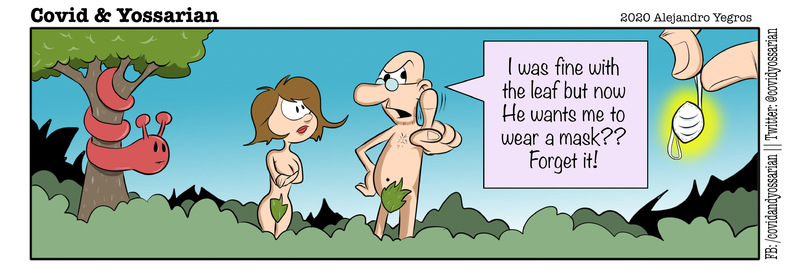 2020-05-13
2020-05-13You want me to wear what??
A comic strip about Covid-19 -
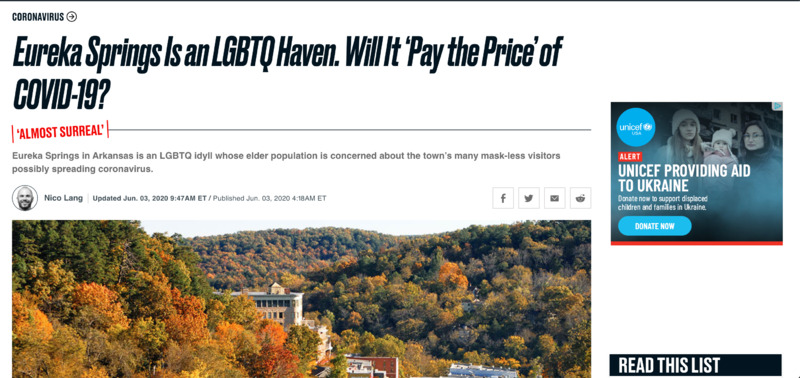 2020-06-03
2020-06-03The Survival of an LGBTQ+ Community in the Bible Belt During the Age of Covid-19
Deep in the Ozark Mountains lies the small resort town of Eureka Springs, Arkansas. This community relies heavily on tourism, shopping, and the many natural spas erupting from within the Ozarks. This community is also home to a thriving LGBTQ+ community in the heart of the Conservative Bible Belt. As Covid quickly enveloped Arkansas and restrictions were placed on activity, Eureka Springs and the LGBTQ+ crowd suffered. While there is a strong Queer population in Eureka Springs, the area is home to a strong evangelical crowd. This article details how the LGBTQ+ community took greeter precautions to protect against Covid, while the Evangelical crowd largely disregarded the pandemic entirely. Covid truly resurfaced a tremendous divide amongst the population of Eureka Springs which had, for the most part, been stable. The nature of pandemic regulations and the adherence or neglect of these regulations spilled over into the greater conflict between Evangelicals and the LGBTQ+ community, an occurrence that would otherwise be non-existent without the presence of Covid-19. This article highlights that while Covid seems to have the primary grip over our lives at the moment, we must be conscious of the impact Covid can have on other areas of life, deep-seeded conflict, and the general safety of vulnerable groups. -
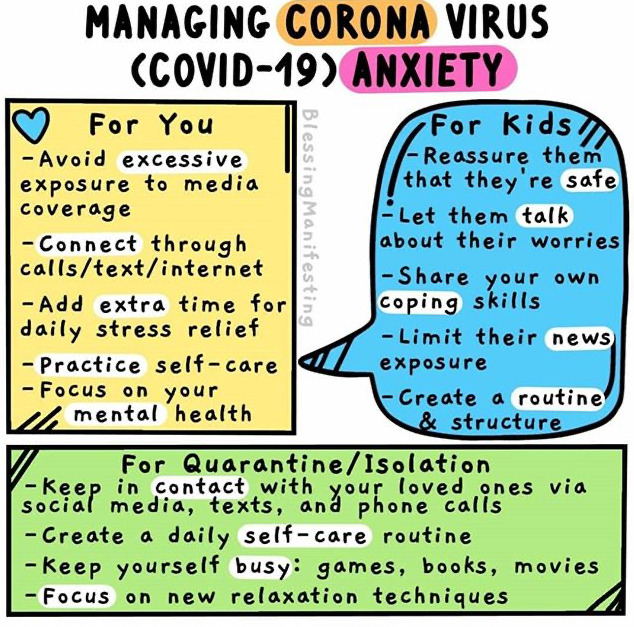 2020-03
2020-03Suffering from Anxiety
As most young adults my age, I suffer from severe anxiety. Dealing with anxiety daily, can be very challenging at times, especially during a pandemic. I have been fighting a battle with anxiety most of my life. At this point, I am really used to the extra thoughts in my head. I have learned to help manage it, but not completely get rid of it. I believe that anxiety has made me who I am, in a way, because I do not remember a time where I was not struggling. In 2020, a pandemic instantly flooded the world. This completely impacted my entire life. I was not able to experience my last year in high school, I was not able to be around the one person that helped me with my anxiety, etc. I was forced to wear a mask that I could barely breathe in. I lost touch with most of my friends that I developed over my lifetime. This instant wave of depression suddenly hit me. I was so nervous on what would happen next, and how long will this last. People were dying from this pandemic. I constantly worried about if the sickness would hurt one of my family members or someone important to me. Over the time of being in quarantine, I thought to myself ways on how I could relax and not worry so much about the pandemic. I told myself every day, “Everything happens for a reason”. This is what I truly believe and for some reason it really does calm me down. I am Catholic. I am a very deep believer in God. To me, trusting in the Lord is the best anxiety reliever around. Covid-19 is still around today. Without Covid-19, I would not be where I am today. Although this pandemic has an abundance of negative impacts on my life, it also had some positive ones, too. I would not have attended Duquesne University, met so many amazing people, and made a plethora of memories that I would not trade in for. I believe talking about my anxiety, especially during the pandemic, is very critical because I am not the only one who is suffering, too. Everyone is nervous about what is going to happen next. To me, this is HUGE on helping me with my anxiety. I can finally think to myself that I am not alone. I believe that people who suffer from anxiety, especially from the pandemic started in 2020, can have a place to go if they are nervous. When I was struggling, I felt alone, and I was the only person who felt this way. My story will allow people to realize that they are not alone. Everyone is dealing with this stress and anxiety that I suffered from. My story tells people that I have worries and doubts, too. The pandemic not only had negative impacts, but they also had positive impacts. Focusing on the positives, will distract you from the anxiety and worrying. My story should help prove that. My story should allow people to see and find new ways to cope with the stress. I hope my story leaves a positive impact on people who did or are struggling. Everyone is in this together, and nobody will be alone in this major impact on the world. -
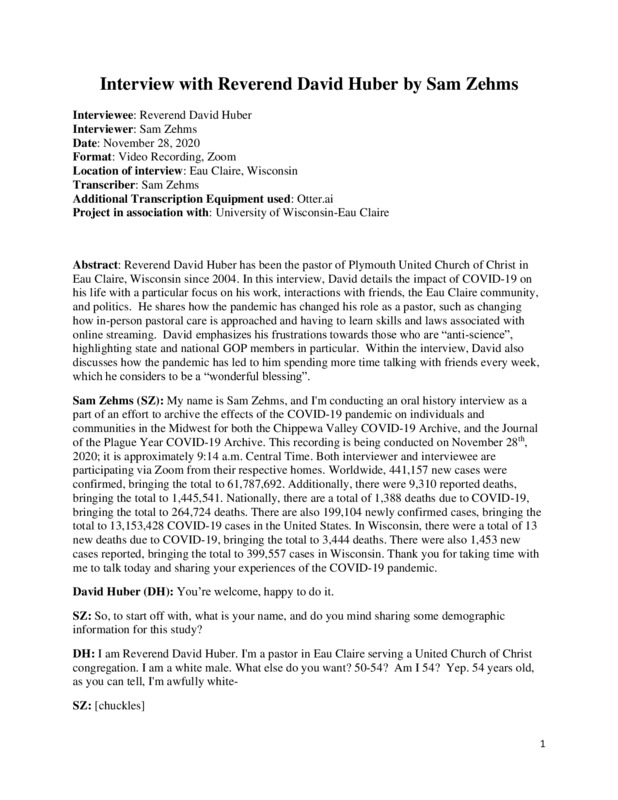 12/15/2020
12/15/2020David Huber Oral History, 2020/12/15
C19OH -
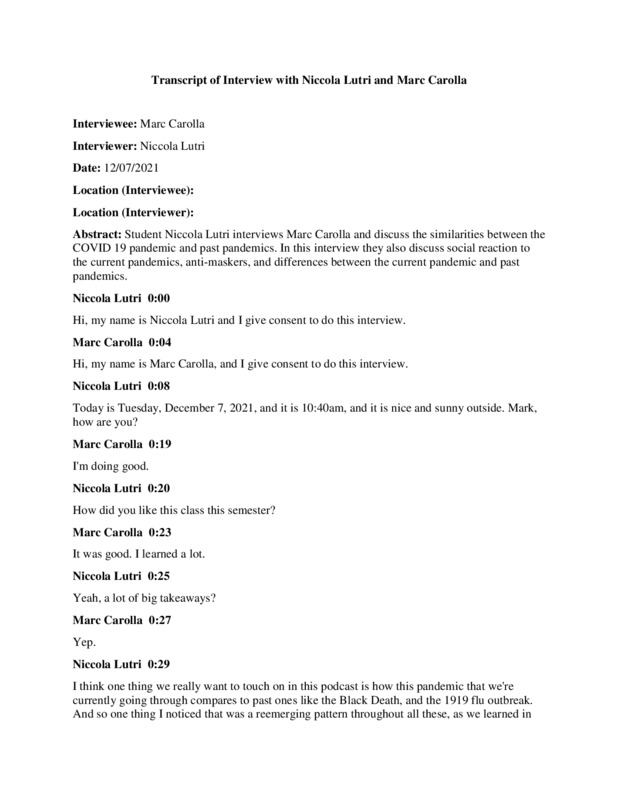 2021-12-07
2021-12-07Marc Carolla and Niccola Lutri Oral History, 2021/12/07
Marc & Niccola discuss their experiences with COVID-19 and relate it to past pandemics that they learned about in class -
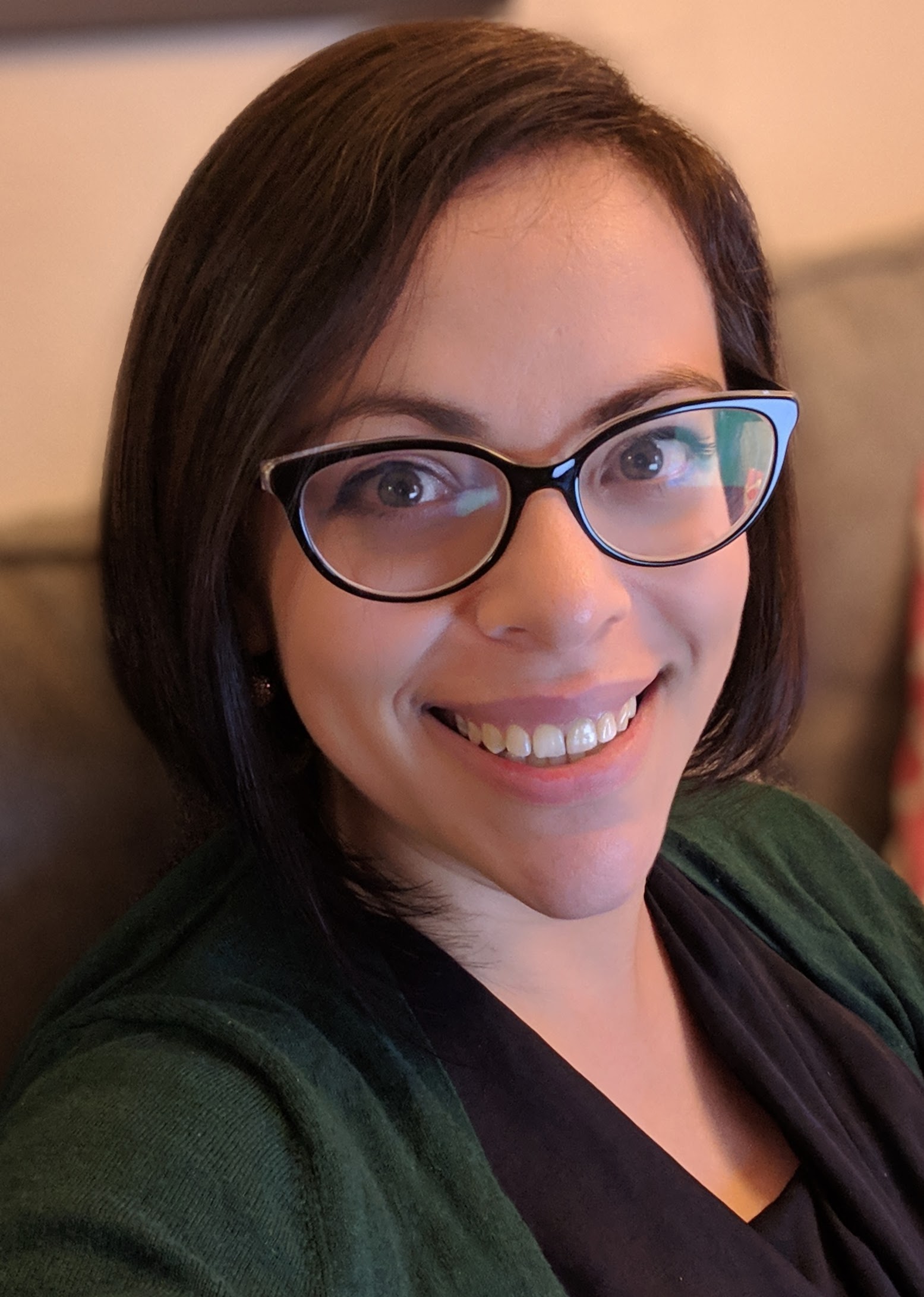 2021-11-09
2021-11-09Professor Perspective on University Changes
Dr. Sara Ronis, a theology professor at St. Mary’s University, gives us a faculty perspective on how she believes the university handled the COVID-19 pandemic. She feels that despite being in such difficult positions, the university made the decisions they knew would be best for the St. Mary’s community. As a professor, she immediately thought of her students when COVID cases began to rise and the possibility of being sent home became an even more real possibility. She admires how St. Mary’s students, new and returning, have adapted to these new learning environments. -
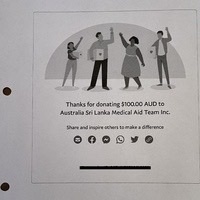 2021-05-06
2021-05-06HIST30060 Practicing religion during lockdown
Through discussions with my grandmother, I reflected on an interesting intersection between the impact of the lockdown on both older Melburnians and faith communities. My grandmother is a practising Buddhist; a key annual ritual that was unable to be undertaken in 2021 was the commemoration of my grandfather’s death anniversary, typically observed by preparing food and inviting friends and relatives to our home for a ceremony (known in Buddhist ethics as sharing ‘merits’ with the deceased to send them good fortune). As this gathering was not permitted, my grandmother shared ‘merits’ with my grandfather by instead donating to a charity; I think that such as example highlights the mediation between religious practices and natural sciences, in the context of this health crisis. Pictured is the receipt from my grandmother’s donation; sharing her wealth by committing this good deed was important to her during this time. -
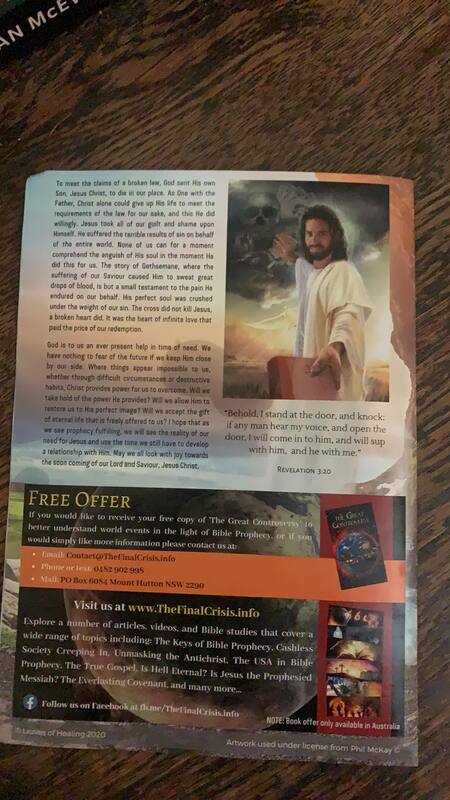 2021-10-30
2021-10-30HIST30060: Quasi-religious Anti-lockdown Pamphlet
This pamphlet was dropped into my letter box during the height of Melbourne's anti-lockdown protests. It speaks to the religious aspects of the anti-lockdown movement. -
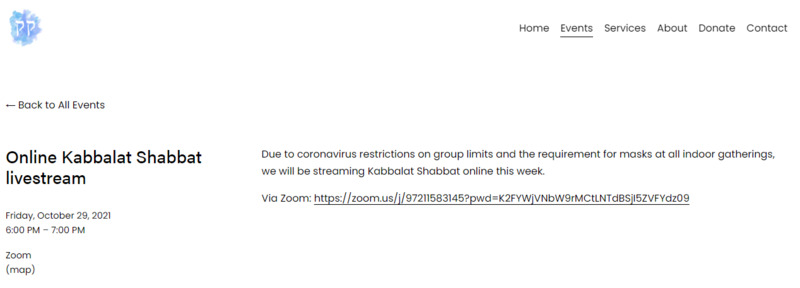 2021-10-29
2021-10-29Kehilat Kolenu Online Services - Jewish Melbourne
During the lockdowns and COVID restrictions in Melbourne, Jewish communities found ways to connect. Especially important are the Friday evening services for Shabbat. Kehilat Kolenu, a Humanistic Jewish organisation held zoom meetings in place of their usual Kabbalat Shabbat services. Especially during the loneliest, most isolating periods in my lockdown experience, these zoom meetings where I could hear the songs of my culture helped me feel spiritually and socially reconnected. HIST30060 -
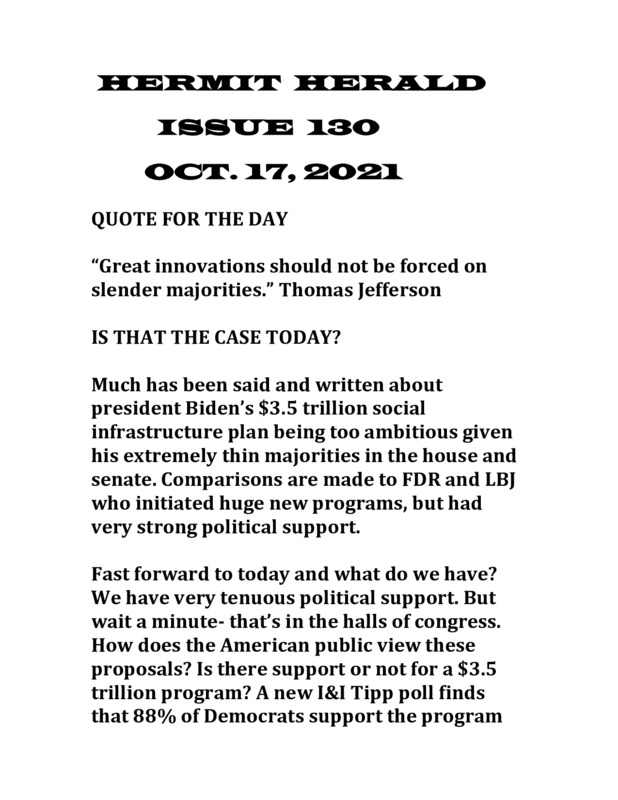 2021-10-17
2021-10-17HERMIT HERALD, ISSUE 130
$3.5 TRILLION BILL, YES OR NO -
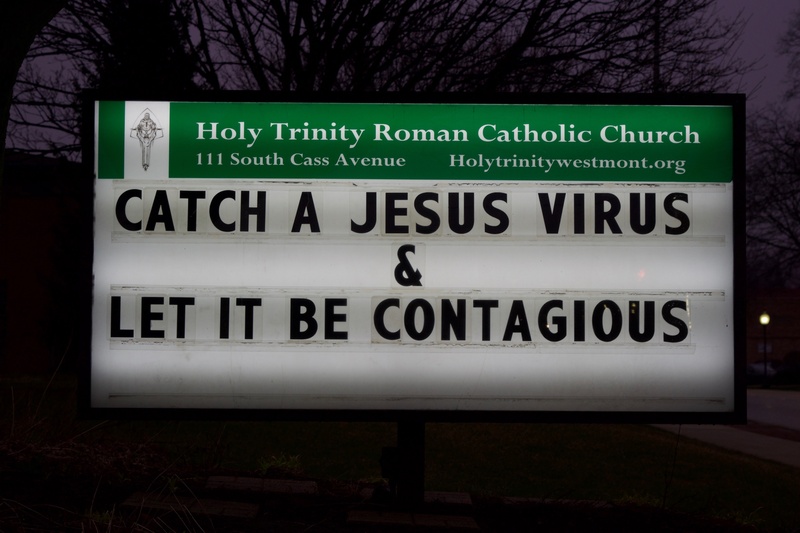 2020-03-28
2020-03-28Catch a Jesus Virus and Let it be Contagious
My boyfriend and I found this church's billboard during the first week of shutdown in March 2020. We were driving around with nothing to do since everything was closed and found this sign too funny to not stop and take a picture. -
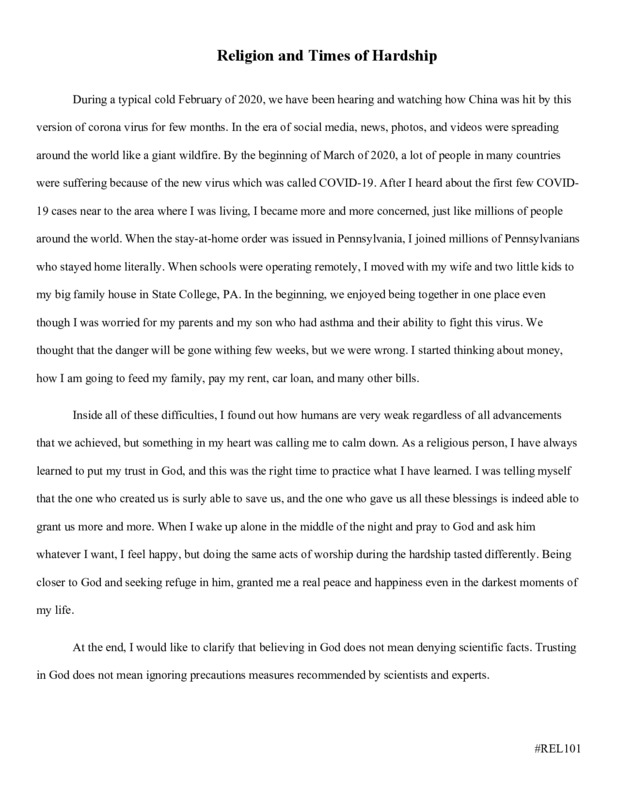 2021-10-04
2021-10-04Religion and Times of Hardship
I am writing my own personal experience of how religion affected my lifestyle during COVID-19 pandemic -
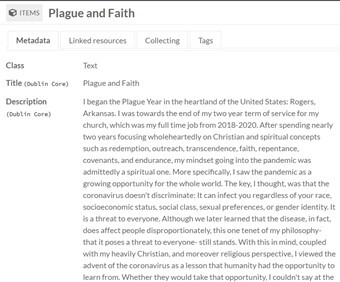 2021-10-04
2021-10-04Plague and Faith
I began the Plague Year in the heartland of the United States: Rogers, Arkansas. I was towards the end of my two year term of service for my church, which was my full time job from 2018-2020. After spending nearly two years focusing wholeheartedly on Christian and spiritual concepts such as redemption, outreach, transcendence, faith, repentance, covenants, and endurance, my mindset going into the pandemic was admittedly a spiritual one. More specifically, I saw the pandemic as a growing opportunity for the whole world. The key, I thought, was that the coronavirus doesn't discriminate: It can infect you regardless of your race, socioeconomic status, social class, sexual preferences, or gender identity. It is a threat to everyone. Although we later learned that the disease, in fact, does affect people disproportionately, this one tenet of my philosophy- that it poses a threat to everyone- still stands. With this in mind, coupled with my heavily Christian, and moreover religious perspective, I viewed the advent of the coronavirus as a lesson that humanity had the opportunity to learn from. Whether they would take that opportunity, I couldn't say at the beginning, as I had recently seen examples that bolstered my faith in humanity, and also ones that degraded it. This was particularly interesting to consider immediately after exiting the 2010s, a period that many Americans and people of the world view as a tumultuous one. What I can say, however, is that I was optimistic. Even if a divisive political climate, humanitarian crises across the world, the longest war in American history, and a widespread mental health crisis couldn't jumpstart people's empathy for one another, hopefully a worldwide pandemic could. Looking back after 18 months of plague, I would say that I have observed mixed results. In very visible ways, the world, and particularly the United States, has become considerably more divisive. I look at the rise of conspiracy groups, the charged conversations I've observed related to masks or vaccines, the storming of the capitol, or the events that led to the Capitol Hill Autonomous Zone, and I think that the pandemic has only served to stress people beyond their breaking point. I am disappointed. Now that I am much more involved at a secular institution, in a state university, and much less involved in my church, I often fall into skeptical and even cynical thoughts lamenting humanity's inability to learn a lesson. I revile at the unchecked pride that rules the lives of so many. I look around and see many who would rather be "right" than be objectively correct. These people are my friends, family members, former mentors, and authority figures. Like the Coronavirus, these shortcomings of character have the ability to affect anybody. I would like to say that I have seen the same results on the other side, that I have seen enough examples of individual acts of courtesy and kindness to offset the vitriol, but I don't know that I can. I also don't know if I can't in good conscience make that observation, the proverbial jury is still out on that one. That will take more time to see. True change is something that stands the test of time, which we haven't had the luxury of observing yet. While the hate, cynicism and conflict that I have previously mentioned are very visible, and immediately announce themselves, change in the perspectives and hearts of people is more of a slow and gradual process, especially considering that the pandemic is not over. I hope to observe in later years that this pandemic defined our generation in a positive way, the same way that our progenitors gained appreciation and humility and grit from the great depression. I know that I, for one, have made efforts to do the same. I suppose that this all comes back to faith- faith that I have that this will one day be worth it. Although my life is a lot more secular these days, I retain the same faithful perspective that I gained volunteering with my religious organization for 2 years, the one that I had at the beginning of the Plague. It has not broken me, and deep down, I don’t truly believe that it’s broken the collective “us”, either. -
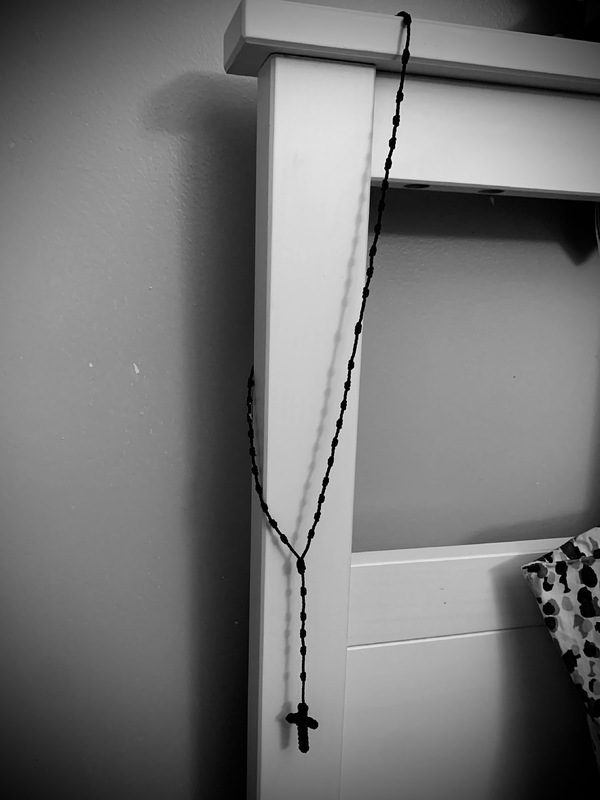 2020-04-03
2020-04-03Light to the Darkness
This picture I'm submitting is a picture of the rosary I've had hanging on the headboard of my bed since when I had covid. On April 3, 2020 I woke up to have some banana pancakes and my tea and discovered I couldn't taste anything and then tried to smell my perfumes and couldn't smell anything either. I knew it was covid. I was afraid and at night I'd cry and be anxious to the point where my anxiety made it hard to breathe and would think it was because of the virus. It was then that I realized my faith lacked. I got out of bed and went to get that rosary hanging with the rest that my mom had and I started praying. For the next couple of days leading to Easter Sunday, I'd pray and feel comfort knowing I had my rosary there. It made my days with the virus, bearable. A year and a half later, I still have my rosary hanging there. It has helped make everyday bearable and reminds me to continue having faith. -
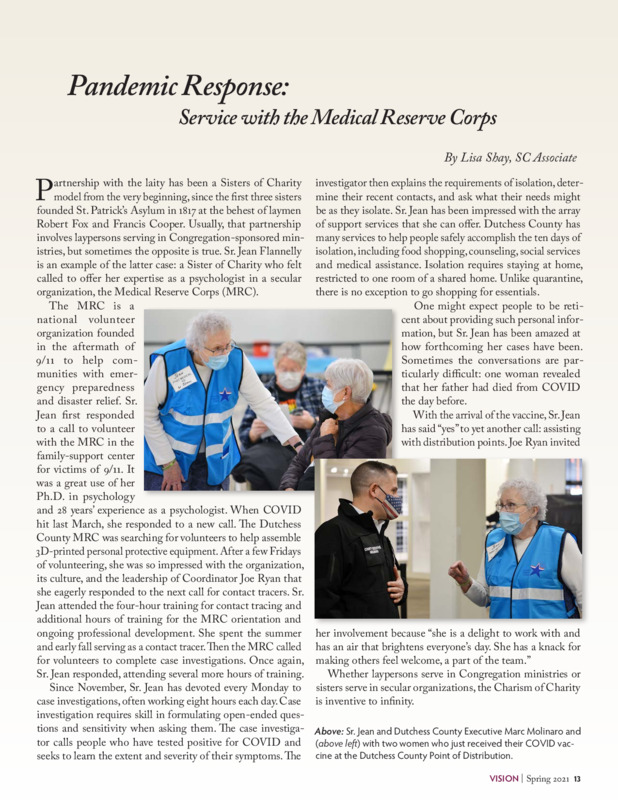 2021-03-02
2021-03-02A Religious Sister’s Service with the Medical Reserve Corps
This article celebrates the dedication of a friend and mentor, Sister Jean Flannelly, SC, who, at age 80, volunteered to serve with the Dutchess County New York Medical Reserve Corps to help people affected by the pandemic. Despite age and some health problems, she felt called to use her many talents as a psychologist, teacher, counselor and religious sister to do contact tracing, case investigation and serve in various roles at COVID-19 vaccination sites. She is an inspiration to me and to many! -
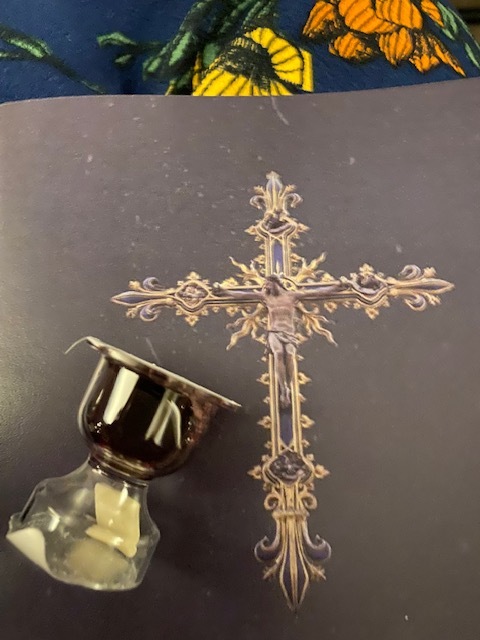 2021-08-08
2021-08-08New Normal?
I went to church this past Sunday for the first time since the quarantine of March 2020. I'm not sure what I was expecting but there were a lot more changes than I had imagined. Sanitizing stations, hand wipes, and masks for those who wished to wear them. People were still socializing, not everyone was wearing masks but it was nice to see that it was an option and available to those who wanted. Before the pandemic, there was always a table with refreshments where we would go and grab pastries before Sunday school. Now that table had someone there to grab pastries in an attempt to limit contact. There were so many viable changes outside but the one that stuck to me most was the one I caught inside. Communion is a very important aspect of the Christian faith, I remember growing up in a Hispanic church there was a ceremonial feel to communion. It was a special occasion, a time to reflect and remember the foundation of our faith. I kept that feeling with me growing up but this past Sunday I was taken back when I walked into church. I was handed what I thought was a trinket. I sat down and stared at this object for a second, this was how we were to take communion. Of course, it makes total sense not to pass a tray around with crackers and juice to a building full of people, especially because you can never know for sure who's been vaccinated and who hasn't. This was just an unexpected change that the pandemic brought on, I wonder if this will be part of the "new normal" everyone is always talking about. -
2021-08-09
THE19: Howl of a Mad (American) COVID-dodger, a Dia-Rant
A year from the perspective of an immuno-compromised, mulitple comorbidities survivor stranded in place until vaccine in a poor, rural, underserved and politically conservative Colorado ski and summer resort community over run by affluent COVID torurism. -
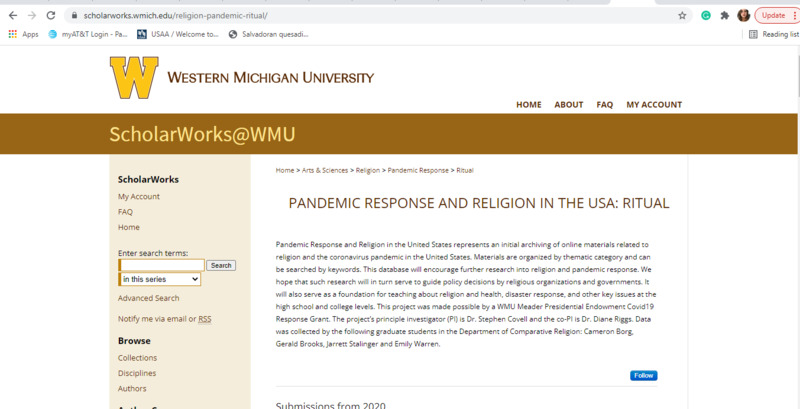 2021-07-24
2021-07-24Pandemic Response and Religion in the USA: Ritual
This digital archive consists of online materials related to the COVID-19 pandemic and religious practices during this time. -
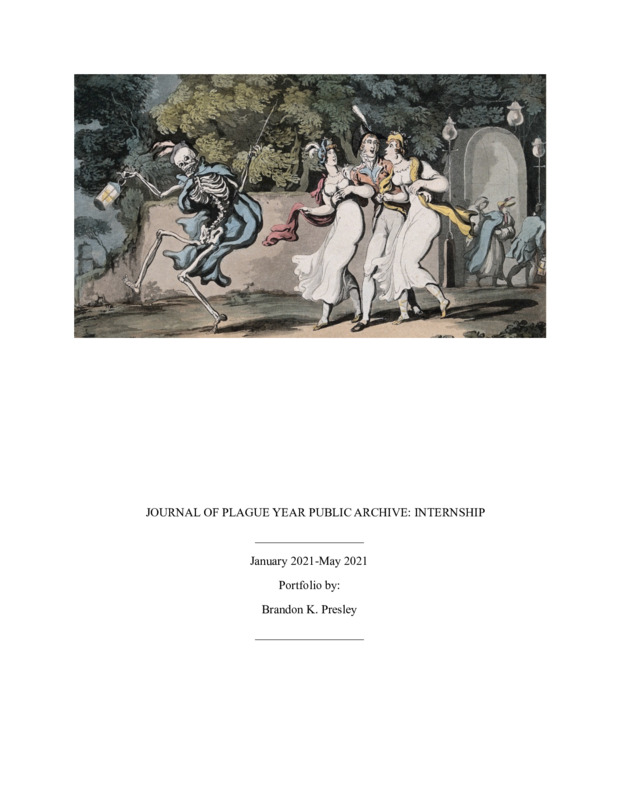 2021-04-24
2021-04-24JOTPY Internship Portfolio
This is my portfolio from my experience of working as an intern with the Journal of the Plague Year Public Archive. -
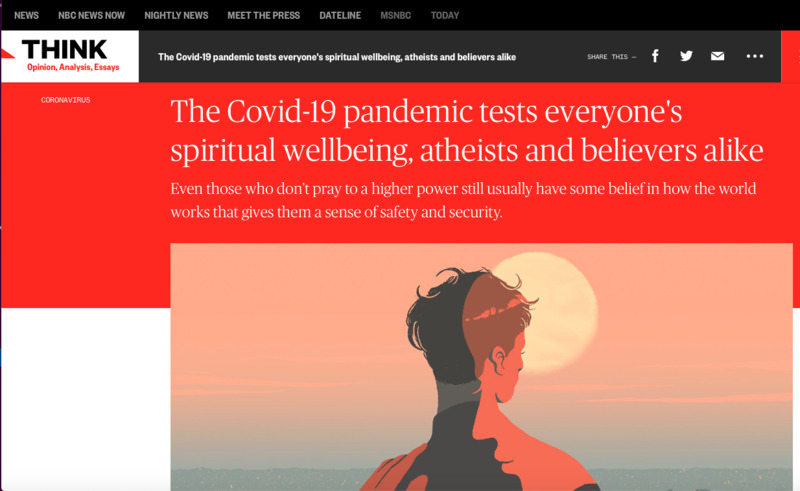 2020-09-21
2020-09-21The Covid-19 pandemic tests everyone's spiritual wellbeing, atheists and believers alike
When looking at the pandemic, regardless of one’s religious beliefs, or lack thereof, nearly everyone’s spiritual wellbeing has been tested. On one hand, spiritual struggle has been linked to higher mortality rates as well as depression. On the other, however, proper spiritual care has been shown to help people get through a rough time. Chaplains play a major role for those who are sick or injured. Simply because someone does not identify with organized religion does not mean they can be provided with spiritual care. -
2021-04-23
What life was like in the Military with COVID-19
My story is very similar to all my fellow military members. -
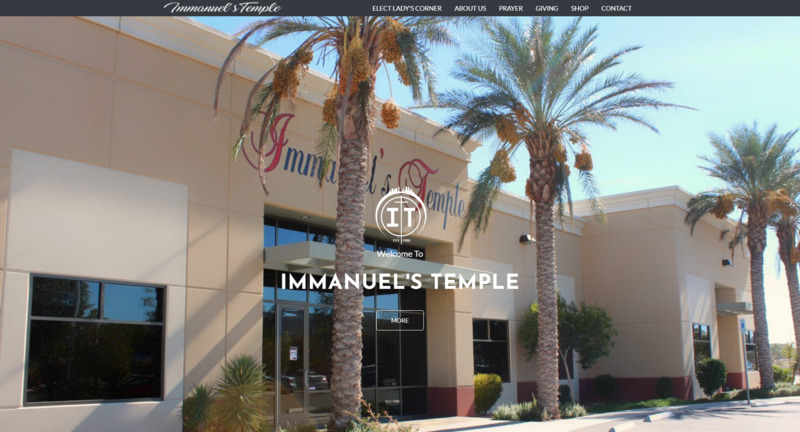 2020-03-15
2020-03-15Rest in a Time of Time of Unrest: COVID-19 Quaratine, Religion, and Public Life Reflection
My personal experience with COVID-19, My active involvement in my religious community and my public life reflection during times of a pandemic and political/ social unrest. -
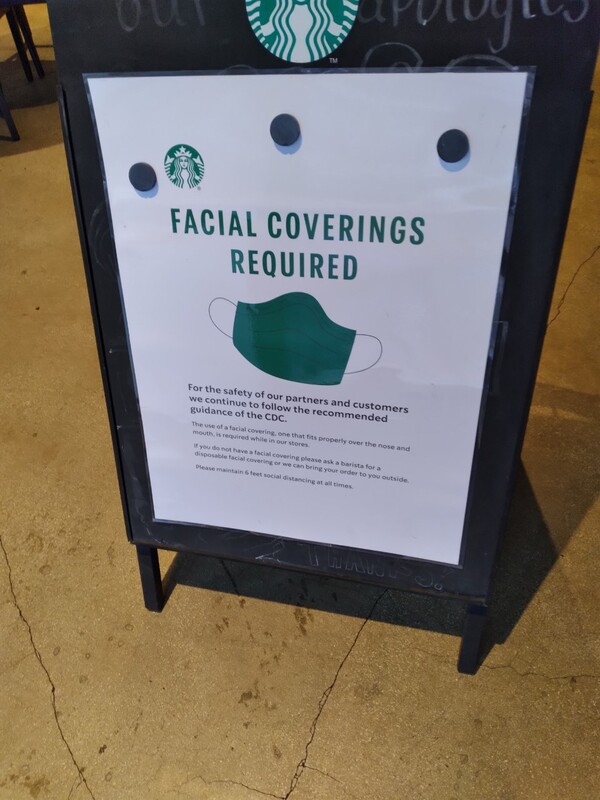 2020-06-15
2020-06-15A Tiresome Year
During this first year of Covid-19 has taken place, I can sum it up in a single word "wearisome". When this pandemic started in the year 2020, the southern part of Texas seemed to be unyielding in the hustle and bustle of everyday life down here. The attitude and lack of being a courteous person continued until about the middle of July. This was the starting point of the pandemic begging to affect people enough to begin to take notice of this "uncertain time" as if a miracle the everyday average Joe wasn't hassling me for being wearing a mask. This tale of endless misery starts at the beginning of Covid-19 and stretches until the middle of June 2020. Some background information about the antagonist of this tale is a religious youth group of about twenty would come to every Thursday and order an obnoxious amount of items all very rudely. This instance in particular struck a chord with me. This one religious group of younger children (probably about eleven to fourteen) and an older gentleman named Moshi. This group I loathed, just for the sole reason that these children would run about with no mask and caring not for social distancing, and this gentleman was pushing these children to not follow CDC protocol. Well about after a good eight months these children and a new gentleman came in all wearing masks and seemingly decent and well-mannered. This new individual had replaced Moshi and lectured this devil-children about the importance of wearing a mask and being just at least a decent human. This religious youth group had come in and sat on our patio every Thursday and seemingly never once did these children follow protocol until Joel the new instructor stressed the importance of being not a walking health hazard. I and all of my co-workers appreciate that man greatly. -
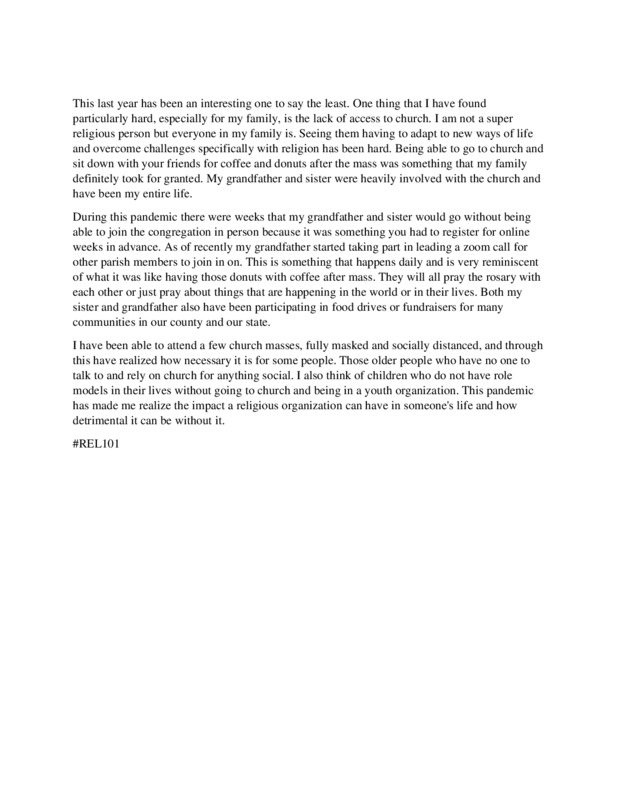 2021-04-22
2021-04-22Why Religion Can Be Important To Many People
The pandemic has showed me the importance of religion in many people's lives including my family's. -
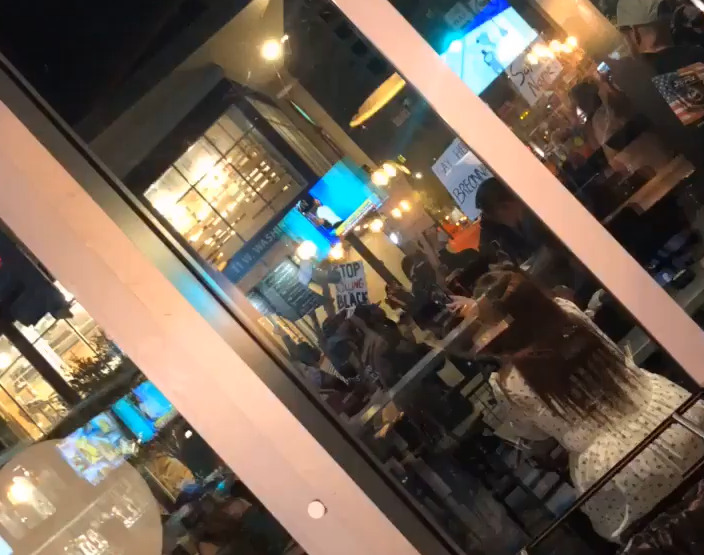 2020-09-23
2020-09-23The power of Gen Z
Living in the pandemic, I have seen my generation grow stronger together as we stand for the injustices occurring in this country. We have spread our ideologies onto social media to spread the message of unity and social justice to prevent further innocent lives from being taken. No violent or oppressive remark goes unseen or unheard of given the word is quickly spread around with social media. Living in the pandemic has allowed the spread of such powerful messages of unity and standing up for what is right to reach every corner of the country. While eating at a local restaurant in Downtown Phoenix, a small yet powerfully loud crowd of BLM protesters passed the location. Watching in awe and feeling some sort of empowerment, it came to my realization of how much these young adults’ voices have spread across the country. Watching the traumatic stories regarding George Floyd and Breonna Taylor (among the thousands of black lives that have been taken by police and civilian brutality over the past couple of decades), I began to fear for the safety of the black communities living in areas that began to pose threats for them. Similarly, I have watched and supported the protests against Asian American violence becoming very recurrent lately and have seen young adults like me speak out against it. Although I am a minority myself, I cannot understand the pain these families go through, but I surely stand by and support these communities. Watching this protest before me made me realize how powerful the second-youngest generation (Gen Z) has grown to be and will continue to blossom as we continue to stand with unity against oppression let it be against race or religion. Although this pandemic has physically separated us, it has also brought many minority communities to come closer and support each other with the hope of one day ending these targeted tragedies. -
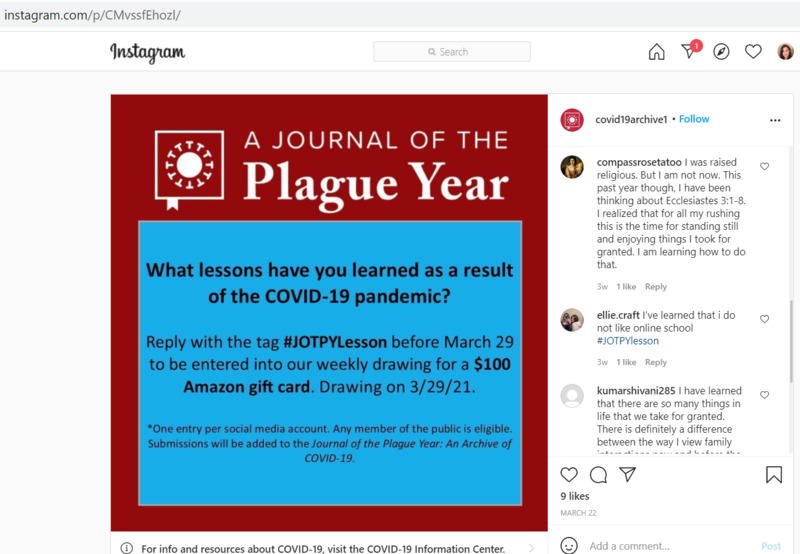 2021-03-22
2021-03-22#JOTPYLesson from compassrosetattoo
compassrosetatoo I was raised religious. But I am not now. This past year though, I have been thinking about Ecclesiastes 3:1-8. I realized that for all my rushing this is the time for standing still and enjoying things I took for granted. I am learning how to do that. -
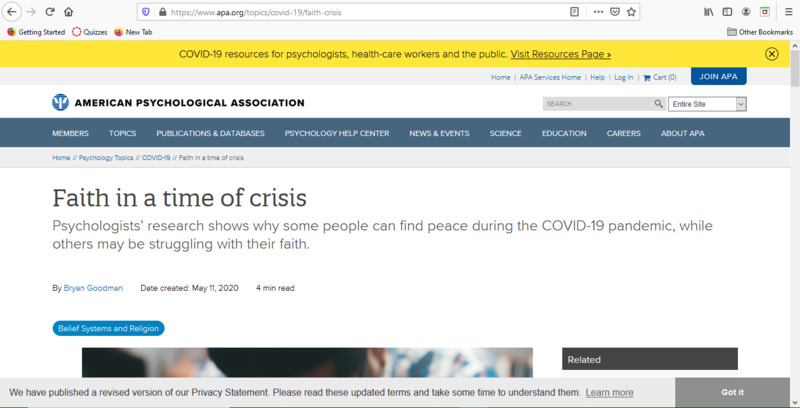 2020-05-11
2020-05-11Faith in a time of crisis
Many people wonder about the benefits religion may or may not have during times of crisis. Is religion a crutch; or, is religion a legitimate way for people re-orient their lives and perspectives during times of crisis? This article from the American Psychology Association answers these questions. Depending on the person and their perspective of their religion, religion can be either positive or negative, perhaps even both at different times. As a result, the answer to the question is not a simple yes or no. However, even for the agnostic or the atheist, as the article describes, there are many religious and spiritual rituals one can engage with (e.g. yoga, meditation, etc.). -
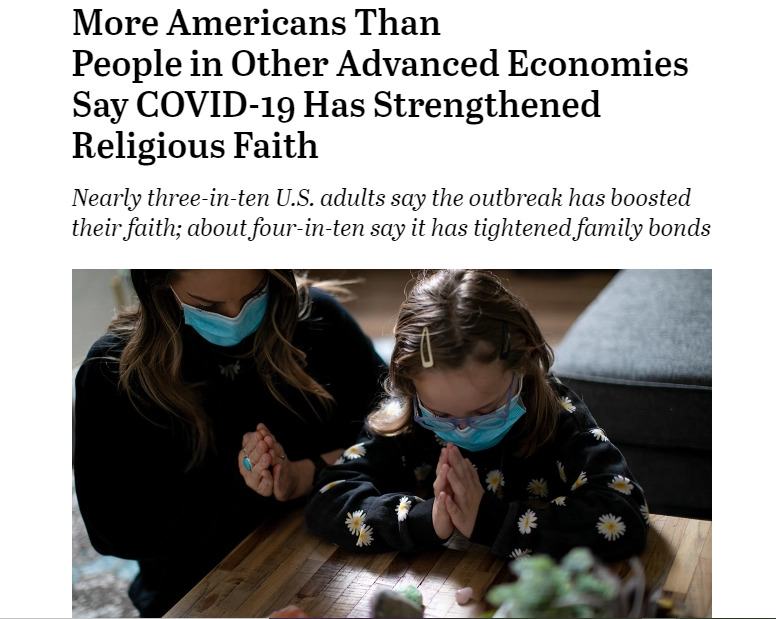 2021-01-27
2021-01-27More Americans Than People in Other Advanced Economies Say COVID-19 Has Strengthened Religious Faith
During difficult times, many people often turn toward religion or faith to provide hope. According to Pew Research, as a result of the pandemic, no Western country with “advanced” economies report that the pandemic has had a net negative impact on religion and faith. In fact, all have a net increase on the reliance of religion and faith. Citizens in the United States, however, are much more likely to say the pandemic has strengthened their faith as opposed to citizens in other countries. While the pandemic has had a net positive for strengthening the faith of people, it has had an even higher positive result for strengthening familial bonds. Family bonds and religious faith has grown stronger for most during the pandemic. -
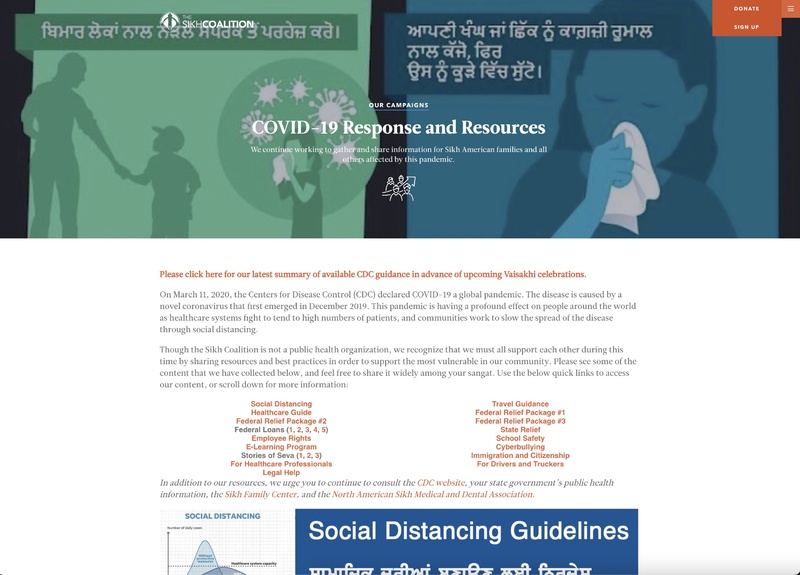 2020
2020The Sikh Coalition: COVID-19 Responses and Resources
Sikhism is one of the most generous faiths in the world, working to help all who may be in need. This site is a great source to see how Sikhs are responding to the pandemic in the various countries where the religion is practiced. Furthermore, one is able to see how Sikhism has contributed to aiding those in need during this time. -
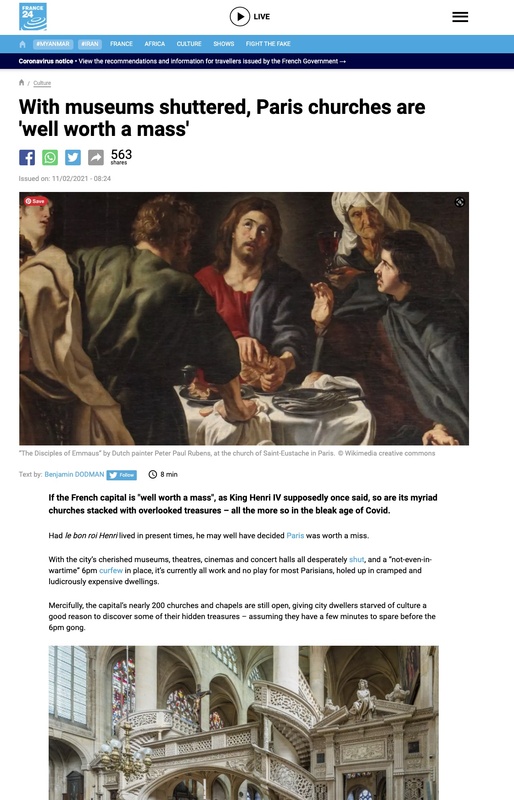 2021-02-02
2021-02-02With museums shuttered, Paris churches are 'well worth a mass'
As France has continued to deal with lockdowns, one bright spot for the French people is that most of the churches remain open. These churches are serving, for many, as a source of art and culture as museums and theaters have remained closed. Despite the fact that many of the Catholic churches in France are missing some of their most historic items, the interest in the art and architecture of the cathedrals has been renewed during the pandemic. -
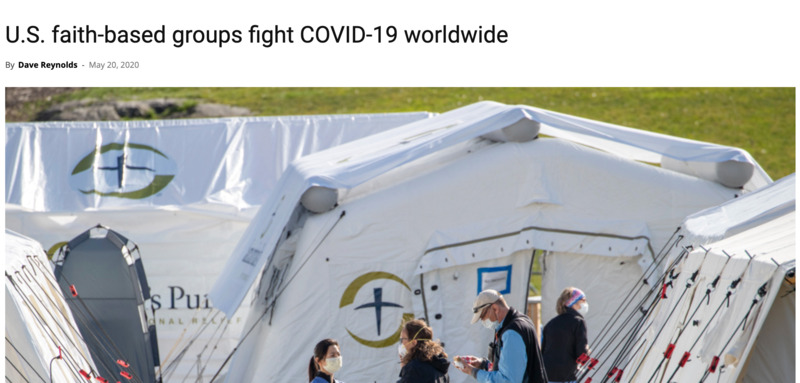 2020-05-20
2020-05-20U.S. faith-based groups fight COVID-19 worldwide
This article explores how faith-based organizations are coming together during COVID-19 and providing aid where possible. Specifically, the author makes note that Christians, Jews, and Muslims are working together during this time to help all people. Not only is this an example of inter-faith ecumenism, but what is actually being seen is a coordinated multi-faith system to give to those who need help. These charities have together to meet the needs of the hungry, are aiding in taking care of those sick with COVID-19, and are helping the poor overseas push through the economic hardship of the pandemic. -
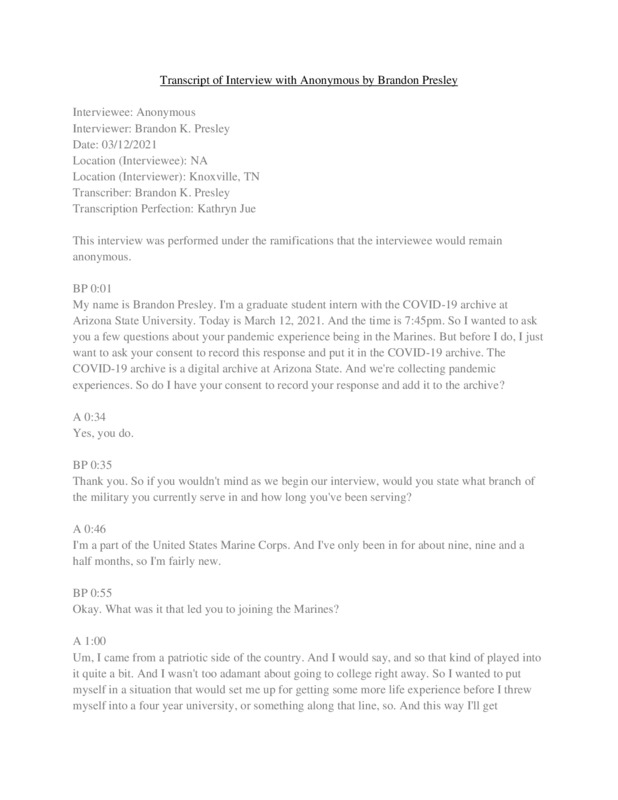 03/12/2021
03/12/2021Anonymous Marine Oral History, 2021/03/12
Interview with a Marine that details going through Basic Training during COVID-19. -
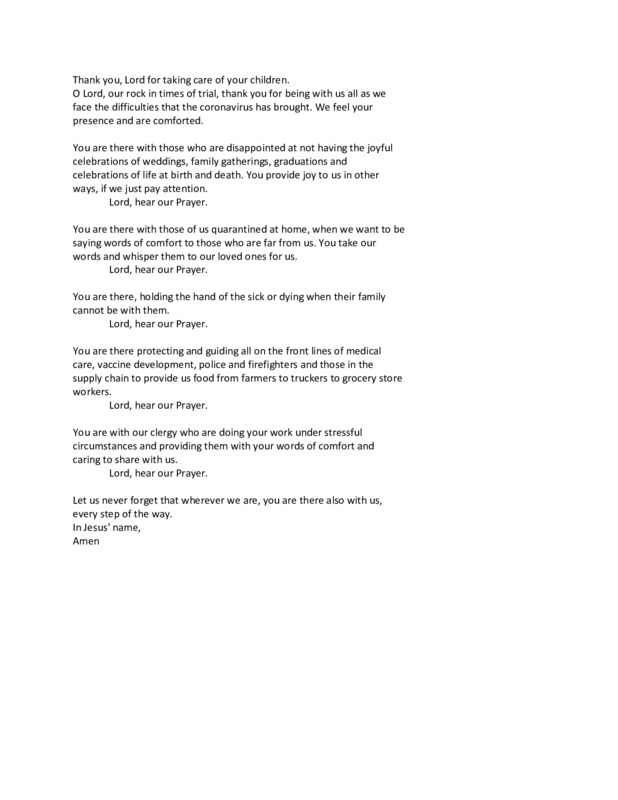 2021-01-19
2021-01-19A Covid Litany
I am studying to become an ordained Deacon in the Episcopal Church. I wrote this litany and shared it with friends and the congregation of my church. We prayed this prayer together as a church weekly for many months. -
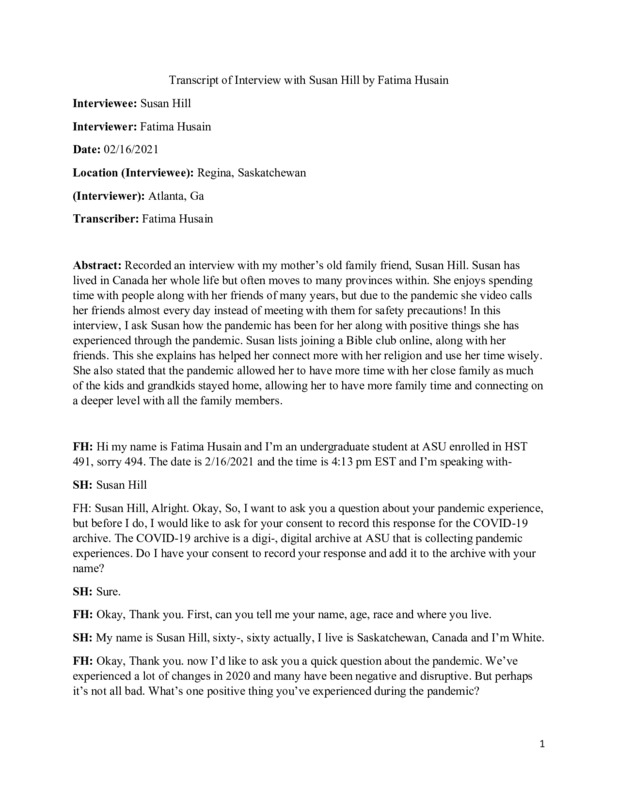 02/16/2021
02/16/2021Susan Hill Oral History, 2021/02/16
I recorded a mini oral history with my mom's old friend about the positive aspects she experienced during the pandemic -
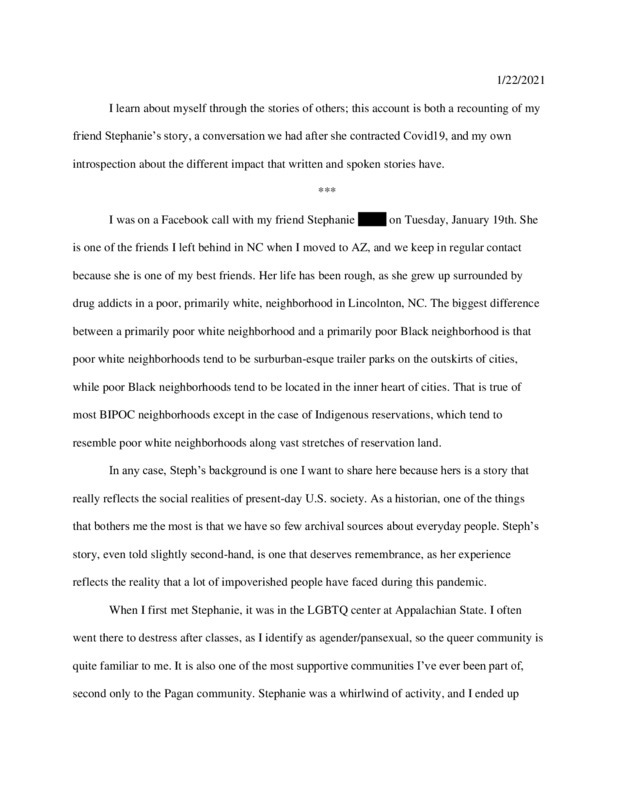 2021-01-22
2021-01-22A Covid Experience
I learn about myself through the stories of others; this account is both a recounting of my friend Stephanie’s story, a conversation we had after she contracted Covid19, and my own introspection about the different impact that written and spoken stories have. -
2020-12-15
Church during covid
Our church stayed open during Covid, even though they were not supposed to. Nobody wore masks, social distanced, it was just like normal. Only about 1 out of every 100 people were wearing a mask. There were about 4000 people at our church. The government tried to shut it down, but the court trial was going to be in 2021. Everywhere in a mile radius of the church had a bunch of signs saying to wear a mask, but of course those signs were ignored. -
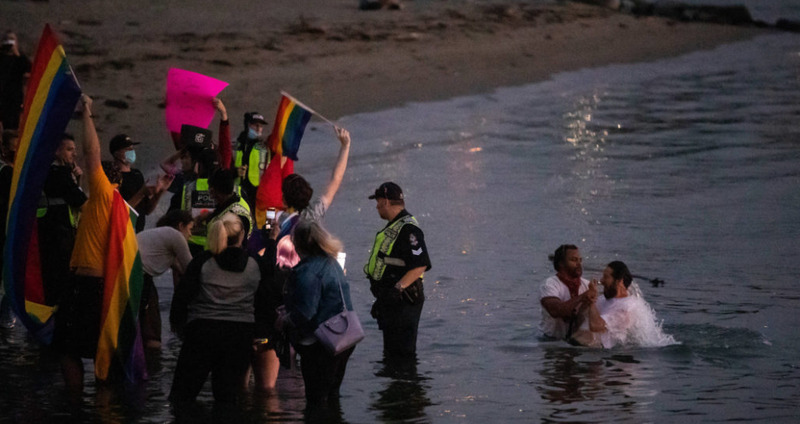 2020-08-31
2020-08-31Photo of LGBTQ protesters
This photo shows protesters, one holding a pride flag, and police. -
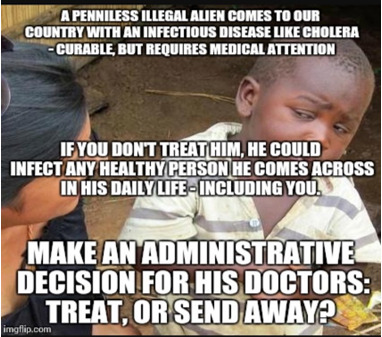 2020-12-05
2020-12-05Relating History from the Past and Present
This was submitted to reveal the parallels throughout history between past and present events, it focuses on detailed evidence that gives a plethora of evidence into Early American History https://www.deseret.com/indepth/2020/4/14/21221205/coronavirus-covid-19-utah-religion-church-closures-william-barr-department-of-justice-constitution -
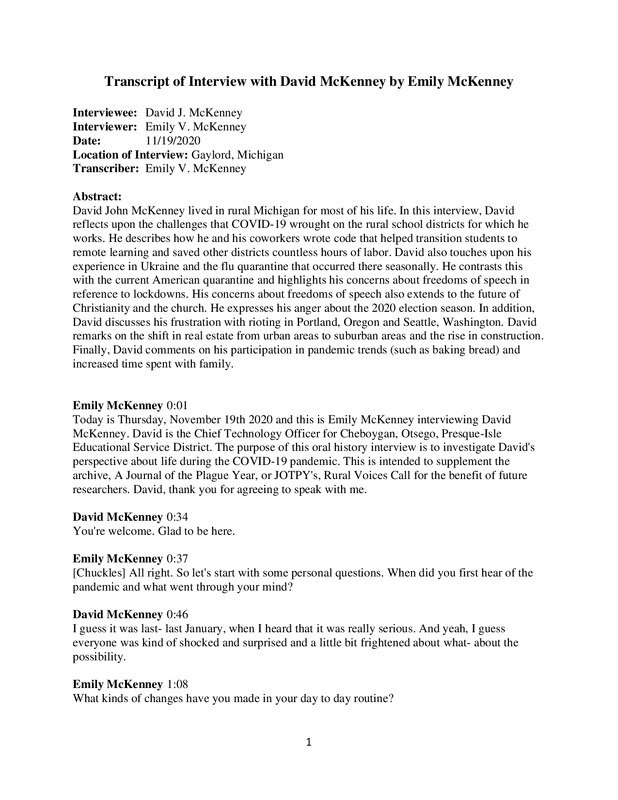 11/19/2020
11/19/2020David McKenney Oral History, 2020/11/19
David John McKenney lived in rural Michigan for most of his life. In this interview, David reflects upon the challenges that COVID-19 wrought on the rural school districts for which he works. He describes how he and his coworkers wrote code that helped transition students to remote learning and saved other districts countless hours of labor. David also touches upon his experience in Ukraine and the flu quarantine that occurred there seasonally. He contrasts this with the current American quarantine and highlights his concerns about freedoms of speech in reference to lockdowns. His concerns about freedoms of speech also extends to the future of Christianity and the church. He expresses his anger about the 2020 election season. In addition, David discusses his frustration with rioting in Portland, Oregon and Seattle, Washington. David remarks on the shift in real estate from urban areas to suburban areas and the rise in construction. Finally, David comments on his participation in pandemic trends (such as baking bread) and increased time spent with family. -
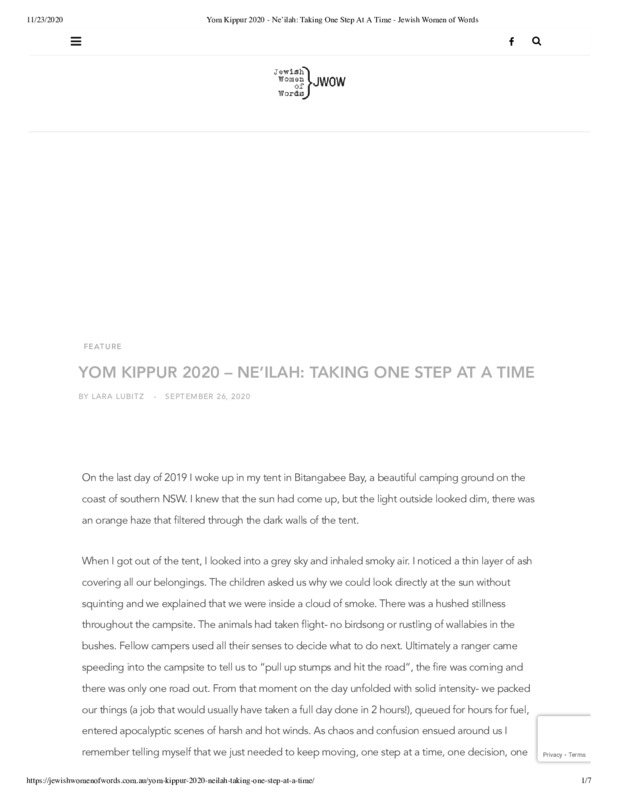 2020-09-26
2020-09-26Jewish Melbourne: Jewish Women of Words Lara Lubitz Neilah drash
A drash written by Lara Lubitz for Neilah 2020, published on Jewish Women of Words -
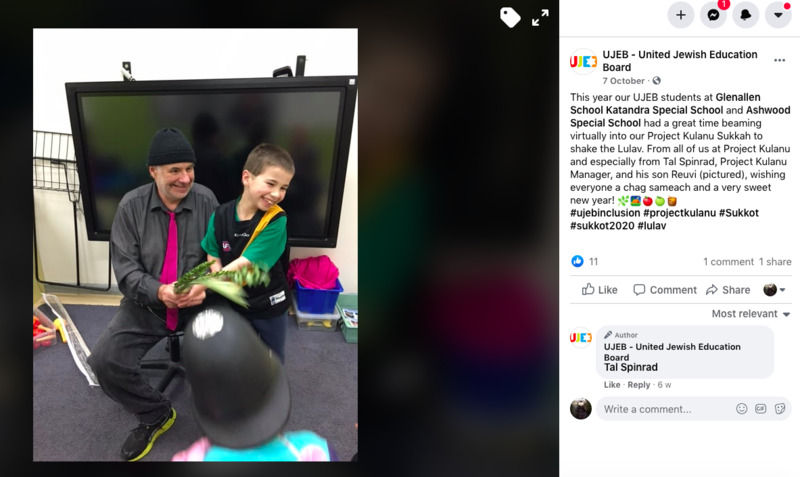 2020-10-07
2020-10-07Jewish Melbourne: UJEB virtual Sukkot at Glenallen School Katandra Special School and Ashwood Special School
"This year our UJEB students at Glenallen School Katandra Special School and Ashwood Special School had a great time beaming virtually into our Project Kulanu Sukkah to shake the Lulav. From all of us at Project Kulanu and especially from Tal Spinrad, Project Kulanu Manager, and his son Reuvi (pictured), wishing everyone a chag sameach and a very sweet new year! 🌿⛺️🍎🍏🍯 #ujebinclusion #projectkulanu #Sukkot #sukkot2020 #lulav" -
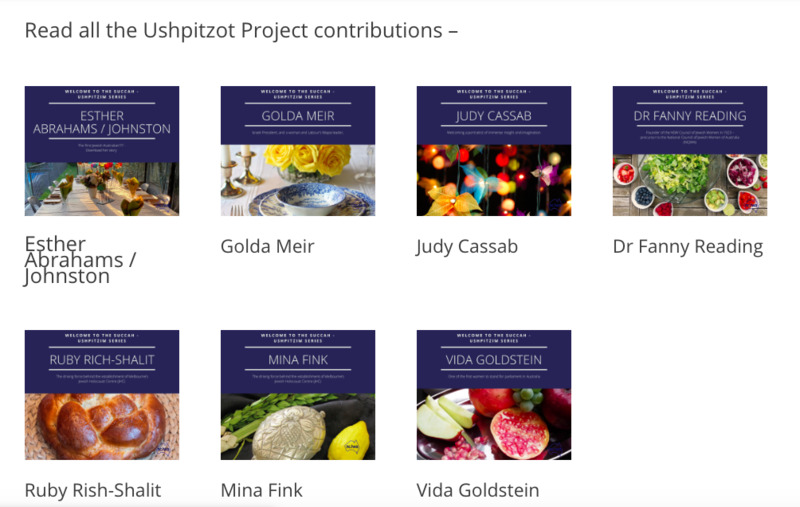 2020
2020Jewish Melbourne: NCJWA Ushpizot project
For Sukkot, the NCJWA presented digital information about 'ushpizot' - women who could be digitally welcomed into the sukkah as the special guests -
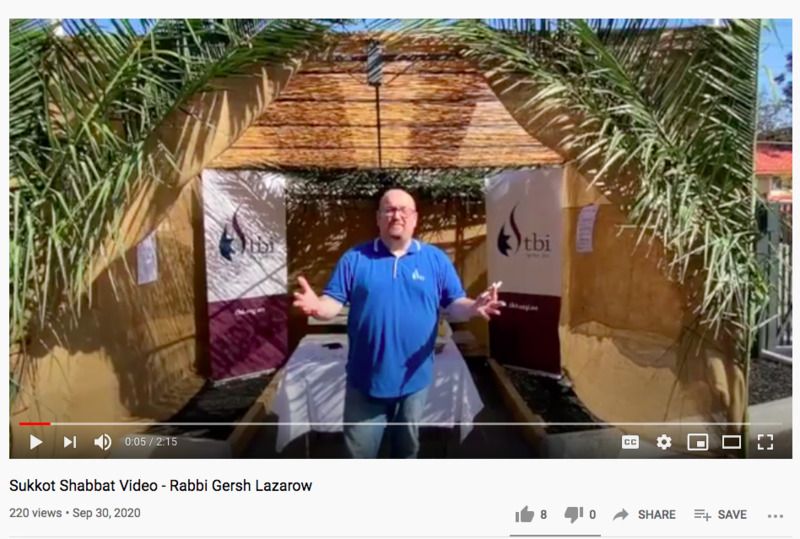 2020-09-30
2020-09-30Jewish Melbourne: TBI Sukkot Shabbat Video - Rabbi Gersh Lazarow
This is a video produced by Temple Beth Israel for Shabbat in the Sukkah -
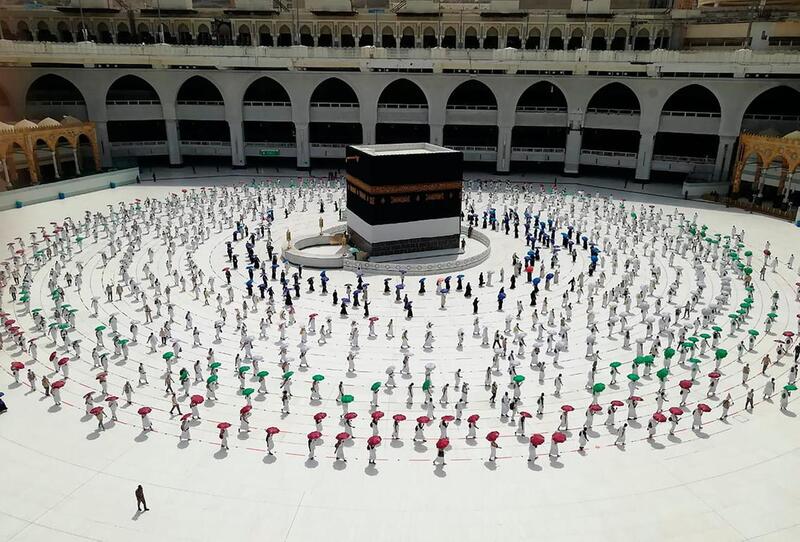 2020-11-09
2020-11-09Covid-19 and Religious Observance
Religious observance was one of the many aspects of daily life affected by the COVID-19 pandemic. In my home country of Bahrain, congregational prayers were prohibited in mid-March, in an effort to slow the spread of the virus. The Friday prayers were restricted to only a single mosque, Bahrain’s largest. Under normal circumstances, Muslim congregants would stand shoulder to shoulder in prayer. This was no longer the case as seen in the photo, social distancing and mask wearing was enforced. The Islamic call prayer (the Azan) was altered, the normal line summoning the faithful to prayer “come to prayer, come to good deeds” was instead replaced with the line “pray in your homes” (as seen in the attached video, which I recorded in Bahrain on). It was surreal hearing this for the time. The Covid-19 pandemic was the first event, at least in my lifetime, where this was done. Historically, this had precedents in times of plague. Moreover, the Muslim Hajj pilgrimage, which draws millions to the city of Mecca in Saudi Arabia every year, was this year limited to a symbolic 1,000 pilgrims. Having attended the Haj myself a decade earlier and been in the midst of the human masses that descend on Mecca, it was very strange to observe the images of the few socially distanced pilgrims which undertook the Hajj in late July 2020. -
 2020
2020Armageddon?
Most believe Jehovah's Witnesses to be just annoying door-knockers but in fact, they are a doomsday cult led by a slightly obscure inner-government called the Watchtower Society. Here is a bit of their doctrine and perspective of what they think of COVID-19.
